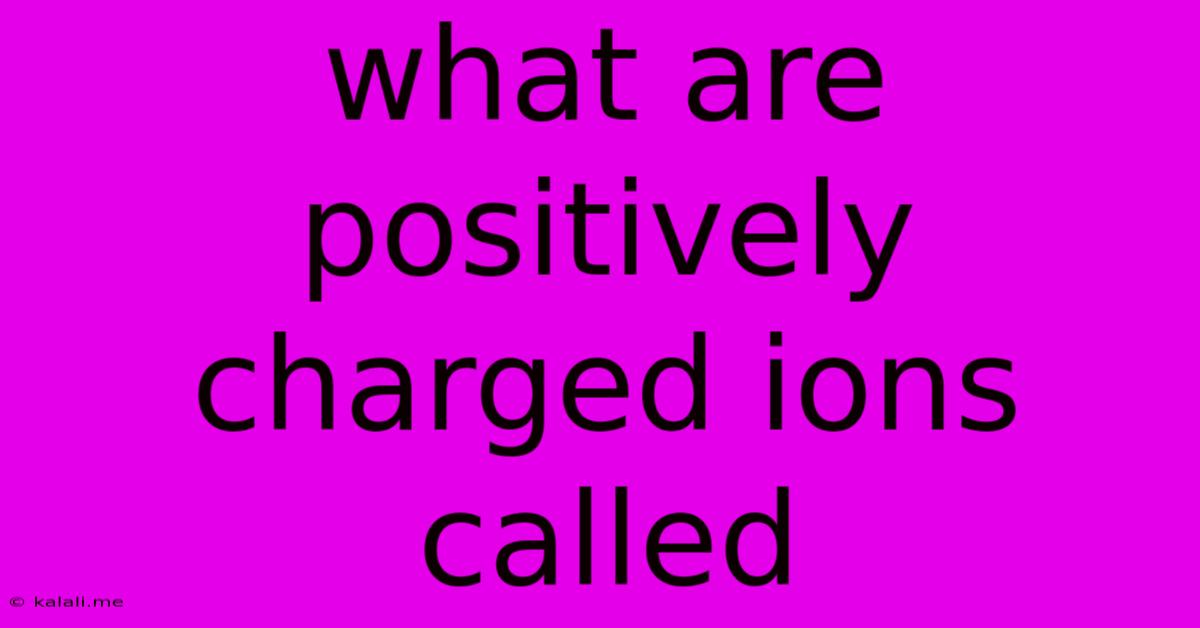What Are Positively Charged Ions Called
Kalali
Jun 13, 2025 · 3 min read

Table of Contents
What are Positively Charged Ions Called? A Deep Dive into Cations
Have you ever wondered about the fundamental building blocks of matter and their electric charges? Understanding the terminology is key to grasping chemistry and physics. This article delves into the world of ions, specifically focusing on those carrying a positive charge. We'll explore what they're called, how they form, and their significance in various contexts.
Positively charged ions are called cations. This is a crucial term in chemistry and a fundamental concept in understanding chemical bonding and reactions. Cations are formed when an atom loses one or more electrons, resulting in an imbalance of protons (positively charged) and electrons (negatively charged). The excess of protons gives the ion its positive charge.
How Cations are Formed: The Loss of Electrons
The process of cation formation involves the ionization of an atom. This often occurs when an atom interacts with another atom or molecule with a higher electronegativity. Electronegativity refers to an atom's ability to attract electrons towards itself. Atoms with low electronegativity tend to lose electrons more readily, forming cations.
For example, a sodium atom (Na) has one electron in its outermost shell. This electron is relatively loosely bound and can be easily lost. When sodium interacts with a highly electronegative element like chlorine (Cl), the sodium atom loses its outermost electron to become a sodium cation (Na⁺). The chlorine atom gains this electron, becoming a chloride anion (Cl⁻). This electron transfer leads to the formation of an ionic bond, holding the sodium and chloride ions together in a stable compound, sodium chloride (NaCl), or common table salt.
Examples of Common Cations
Many common elements form cations. Some prominent examples include:
- Sodium cation (Na⁺): Found in table salt and crucial for various biological processes.
- Calcium cation (Ca²⁺): Essential for strong bones and teeth, and plays a role in muscle contraction.
- Potassium cation (K⁺): Important for nerve impulse transmission and maintaining fluid balance.
- Magnesium cation (Mg²⁺): Involved in numerous enzymatic reactions and muscle function.
- Iron cation (Fe²⁺ and Fe³⁺): Plays a critical role in oxygen transport in the blood (as part of hemoglobin). Note that iron can form two different cations with different charges.
- Hydrogen cation (H⁺): Often simplified to just a proton, this cation is highly reactive and plays a crucial role in acid-base chemistry.
The Significance of Cations
Cations are not just abstract chemical entities; they play vital roles in numerous processes. Their importance spans diverse fields:
- Biology: Cations are essential for many biological processes, including nerve impulse transmission, muscle contraction, and enzyme activity. Imbalances in cation concentrations can lead to various health problems.
- Chemistry: Cations are fundamental to understanding chemical bonding and reactions, particularly in ionic compounds.
- Materials Science: The properties of many materials are directly influenced by the types and arrangement of cations within their structures.
- Geochemistry: Cations play a crucial role in the formation and weathering of rocks and minerals.
In conclusion, cations are positively charged ions formed when an atom loses electrons. Their formation, properties, and significance are crucial concepts across various scientific disciplines. Understanding the concept of cations is essential for grasping a wide range of phenomena in chemistry, biology, and beyond.
Latest Posts
Latest Posts
-
Which Of The Following Is An Example Of A Colloid
Jun 14, 2025
-
Which Gas Do Plants Expel In The Troposphere During Photosynthesis
Jun 14, 2025
-
To Which Class Do Honey Bees Belong
Jun 14, 2025
-
Which Country Is Known As Land Of Midnight Sun
Jun 14, 2025
-
Which Of The Following Is True In A Normal Distribution
Jun 14, 2025
Related Post
Thank you for visiting our website which covers about What Are Positively Charged Ions Called . We hope the information provided has been useful to you. Feel free to contact us if you have any questions or need further assistance. See you next time and don't miss to bookmark.